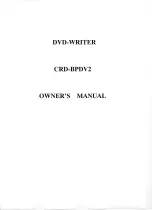
15
Rev. 1.0
11/28/2017
STF-D/IP Hardware Manual
400-820-9661
2.4 Choosing A Power Supply
The main considerations when choosing a power supply are the voltage and current requirements
of the application.
2.4.1 Voltage
The STF drive and motor is designed to give optimum performance between 24~48 Volts
DC. Choosing the voltage depends on the performance needed and diver/motor heating that
acceptable and/or does not cause a drive over-temperature. Higher voltage will give higher speed
performance, but will cause the drive to produce higher temperatures. Using power supplies with
voltage outputs that are near the drive maximum may signi
fi
cantly reduce the operational duty
cycle.
The STF03/06 drive extended range of operation can be as low as 11VDC minimum to as high
as 53VDC maximum(18-53VDC for STF05 Drives, and 18-75VDC for STF10 Drives). When
operation below 11VDC, the STF03/06 series will work unstable. The supply input cannot go blow
11VDC for reliable operation, otherwise under voltage alarm will be triggered. STF03/06 drive will
stop working when this alarm is triggered.
STF03/05/06
If a regulated power supply is used, and that is near the driver maximum voltage of 53VDC ,a
voltage clamp may be required to prevent the voltage over 53VDC which will occurs a overvoltage
fault. When using an unregulated power supply, make sure the no-load voltage of the supply does
not exceed the maximum input voltage 53VDC.
STF10
If a regulated power supply is used, and that is near the driver maximum voltage of 75VDC ,a
voltage clamp may be required to prevent the voltage over 75VDC which will occurs a overvoltage
fault. When using an unregulated power supply, make sure the no-load voltage of the supply does
not exceed the maximum input voltage 75VDC.
2.4.2 Current
When STF drives work with different motors, the recommended power supply output current
capacity under different supply voltage is shown in below table. The STF drive power supply
current is lower than the the winding currents because it uses switching ampli
fi
ers to convert a
high voltage and low current into low voltage and high current. The more power supply voltage
exceeds the motor voltage,the less current will be required from the power supply.
It is important to note that the current draw is signi
fi
cantly different at higher speeds depending
on the torque load to the motor. Estimating how much current is necessary may require a good
analysis of the load to the motor.
Drive
Motor
Voltage
Current
Drive
Motor
Voltage
Current
STF03
STF05
STF06
AM8
24V
Above 1A
STF10
AM23
24V
Above 3A
AM11
24V
Above 1A
48V
Above 4A
AM14
24V
Above 1A
70V
Above 4A
AM17
24V
Above 1.5A
AM24
24V
Above 4.5A
48V
Above 1.5A
48V
Above 4.5A
AM23
24V
Above 3A
70V
Above 4.5A
48V
Above 4A
AM34
24V
Above 6A
AM24
24V
Above 4.5A
48V
Above 6A
48V
Above 4.5A
70V
Above 6A
















































